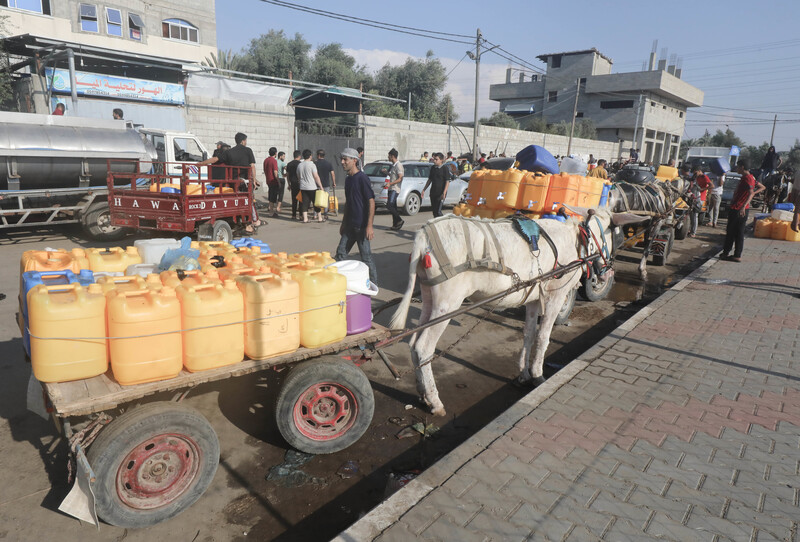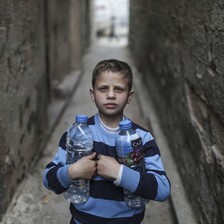The Electronic Intifada 7 November 2023

Water has become extremely scare amid Israel’s genocidal war on Gaza.
APA imagesIsrael’s genocidal war in Gaza has resulted in a severe shortage of essentials.
On 9 October, Israel’s defense minister Yoav Gallant announced a comprehensive blockade. The supply of electricity, food, fuel and water were all cut off.
Abu Muhammed faces extreme difficulties in providing water for his family and three other families who have sought refuge in his home.
He lives in Khan Younis, a city in southern Gaza. Following Israel’s warnings and threats, enormous numbers of people in northern Gaza, including Gaza City, have moved southwards.
About 45 people are now living in Abu Muhammad’s home, including 15 members of his extended family. They – like 2.3 million others in Gaza – face the risk of dehydration.
Abu Muhammad says that fuel shortages and the electricity crisis have disrupted the distribution of water from groundwater wells to homes. There has also been a near-total halt to the delivery by truck of water from desalination plants.
Groundwater – which is salty – is used for washing and for household cleaning.
Abu Muhammad is struggling to fill tanks on which his home relies.
Doing so requires pumps for transferring water to the tanks, which are on the rooftop. The pumps require electricity, which is very scarce.
On one day, Abu Muhammad managed to provide some water for his family and their guests by filling the tanks. He did so by using the electricity supplied to his neighbor, through a generator, for half an hour.
Abu Muhammad is uncertain if he will be able to fill the tanks that way again.
“Distant dream”
A school in Gaza City’s Beach refugee camp is now a shelter for displaced people, trying to escape artillery shells and missiles fired by Israel. They begin searching for water in the early morning.
Sami is staying in the school – run by the UN agency for Palestine refugees (UNRWA) – with eight members of his family. After being deprived of water for a number of days, he went out on the streets asking people he met to help.
He eventually managed to fill a large container with water “from generous families,” he said. “I filled it after a long walk.”
Sami is a farmer who owns land in Beit Hanoun, northern Gaza. Israel has pounded the surrounding area with artillery shells for the past month.
“They have crushed our land and the harvest has gone to waste,” said Sami. “Here we are now, displaced. Access to water has become a distant dream.”
Muneera remained in the Sheikh Radwan area of Gaza City after many of her neighbors evacuated their homes. “Our family’s supply of water is on the verge of running out,” she said.
To survive, Muneera asked neighbors if she could use water from their tanks after they evacuated. She emphasized that she did so as a last resort.
“We borrowed water from our neighbors, emptying their tanks, which are also almost depleted,” she said. “With my children, we brought it to our home.”
Muneera has devised a plan aimed at keeping water use to a minimum. She and her children have been unable to bathe for a number of weeks.
In the kitchen, they use plastic dishes so that not much water will be used for the washing up.
Nobody knows how much longer Israel will continue bombing Gaza.
So long as this war continues, the death toll will keep rising. And there is a great risk that people will not just be killed by missiles, bombs and shells but also by hunger and thirst.
Ghada Hania is a researcher and translator based in Gaza.





